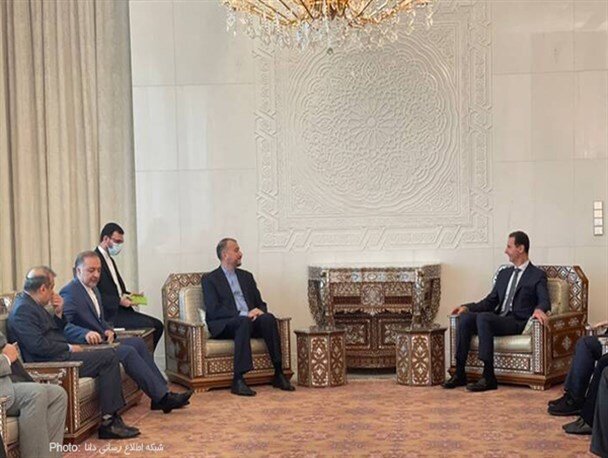Diplomatic atmosphere has changed in favor of Syria: Amir Abdollahian

TEHRAN – Iranian Foreign Minister Hossein Amir Abdollahian said on Saturday that the situation has changed in favor of Syria, citing the atmosphere in the recent UN General Assembly meeting as a proof for his comment.
“The diplomatic atmosphere in the recent meetings of the United Nations General Assembly indicated that conditions have changed in favor of Syria,” Abdollahian said in a meeting with Syria President Bashar al-Assad, according to Press TV.
Abdollahian also hailed close contacts between Iranian and Syrian officials as a sign of deep-rooted relations between the two countries and extended his congratulations to the Syrian president over the Arab country’s victories in the political and international arenas.
The top Iranian diplomat also outlined Tehran’s stance on developments in Afghanistan, saying, “We are in contact with all sides in Afghanistan, including the Taliban and invite them to form an inclusive government.”
He also said that the new Iranian administration is seeking to achieve sustainable economic development even if the cruel foreign sanctions against the country remain in place.
Abdollahian also said Iran will soon return to the Vienna talks intended to revitalize the 2015 nuclear deal it clinched with world powers with a plan to receive the necessary guarantees of verifiable implementation of obligations by the Western parties.
“If the [Vienna] talks yield results, we will take advantage of it to accelerate the implementation of our country’s development plan. But, we will not halt the advancement of our plans because of the talks,” he pointed out.
The U.S., under former president Donald Trump, unilaterally quit the multilateral nuclear deal, officially known as the Joint Comprehensive Plan of Action (JCPOA), and reinstated crippling sanctions on the Islamic Republic, although the country had been fully compliant with the agreement. Trump jettisoned the JCPOA with the illusion of forcing Iran to give in to a rewriting of the JCPOA text.
In early April, Iran and the remaining parties to the JCPOA began to hold talks in Vienna after the U.S. administration of Joe Biden voiced willingness to rejoin the nuclear agreement and lift the draconian sanctions his predecessor had slapped on Iran.
Since the beginning of the Vienna talks, Tehran has argued that the U.S.—as the first party that violated the JCPOA—needs to take the first step by returning to full compliance with the agreement. Tehran also says it will resume all of its nuclear commitments under the deal only after the U.S. removes all the sanctions in practice.
“U.S. refuses to shoulder responsibility for its record in Afghanistan
For his part the Syrian president said the United States’ withdrawal from Afghanistan shows the decline and collapse of Western powers, Press TV reported.
Assad said regional countries and Afghanistan’s neighbors know that the U.S. refrains from shouldering responsibility for its actions and policies in the country.
The U.S. hasty and scandalous exit from Afghanistan after two decades of fruitless war has made Washington look an unreliable partner in the eyes of its allies in Europe, West Asia, and East Asia.
“U.S. seeking to pit Afghanistan’s neighbors against each other”
The Syrian leader added that Iran has the capacity and needs to enter into negotiations with its neighbors and other key players in order to help improve the situation in Afghanistan because the Americans are seeking to pit Afghanistan's neighbors against each other.
American forces occupied the country for about two decades under the pretext of fighting against the Taliban which had given sanctuary to al-Qaeda leader Osama bin Laden, who was considered responsible for the September 11 attacks. But while the U.S. had not still completed its exit from the Central Asian country, the Taliban stormed into Kabul and the Afghan government collapsed and President Ashraf Ghani fled the country.
The Taliban group has pledged to allow the formation of a broad-based and representative government. Concerns, however, remain given its drawn-out history of violence.
“Syria FM to visit Iran in near future”
The Iranian foreign minister also called Syria as “strategic ally” of Iran.
Abdollahian made the remarks after talks with his Syrian counterpart, Faisal Mekdad.
Iran’s chief diplomat said Tehran has proven that it would never leave alone its friends in difficult times.
Abdollahian also said the Syrian foreign minister would make a visit to Tehran within the next days.
He added, “We seek to implement the agreements we have made in recent weeks in telephone conversations between the two presidents at various political, security and economic levels.”
The senior diplomat expressed hope that Tehran and Damascus would improve relations in tourism, trade and joint venture.
Pointing to the latest regional developments, the top Iranian diplomat said, “There are concerns about various issues in the region. We are still witnessing the presence of terrorism and Zionism in the Caucasus region while an inclusive government with participation of all ethnic groups has not been formed in Afghanistan.”
Abdollahian visited Damascus on Saturday to hold talks with Syrian officials. He was welcomed by his Syrian counterpart at Damascus International Airport.
Syria was the third destination of the Iranian foreign minister after visits to Russia and Lebanon.
It was also his second visit to Syria since assuming the post of foreign minister. On August 29, he met with the Syrian president in Damascus.
